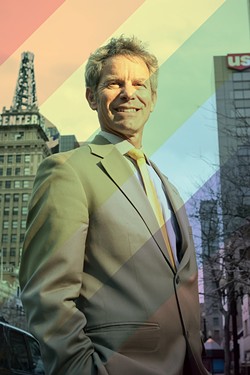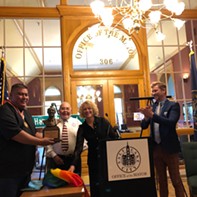LGBT Legacy
Mayor Ralph Becker may have been SLC's most pro-gay mayor yet
By Eric S. Peterson @ericspetersonThe 2015 legislative session saw the formation of an unusual and historic alliance. Mormon church leaders, conservative lawmakers and LGBT activists put their shoulders to the wheel of progress and passed a statewide nondiscrimination law, which protects LGBT Utahns in housing and the workplace, and also carved out religious-liberties protections for people of faith in the state.
But one name that didn't get much congratulatory ink or air coverage was Salt Lake City Mayor Ralph Becker. Becker's original LGBT nondiscrimination ordinance passed in 2009 and arguably set off a domino effect of more than a dozen other cities passing similar ordinances, laying the foundation for Utah's historic statewide law.
Salt Lake County Mayor Ben McAdams recalls that when Becker took on this challenge in 2008, it was a time when tensions were at an all-time high between The Church of Jesus Christ of Latter-day Saints and the LGBT community. In the aftermath of California's 2008 Proposition 8 decision, which banned same-sex marriage in the state, McAdams—then working as Becker's government-relations point man—says some of Becker's associates warned him not to push LGBT causes, for fear of invoking the wrath of the über-conservative Utah Legislature.
In spite of those fears, "Ralph said, 'This was my campaign promise, and I'm going to move ahead with it,'" McAdams says. Now, with same-sex marriage legal nationwide and Utah being hailed as a pioneer for its statewide nondiscrimination law, one might expect Becker would be remembered for his LGBT work in 2009.
But not everyone is singing his praises. State Sen. Jim Dabakis, who himself briefly entered the race for Becker's mayoral seat, says the mayor never really made LGBT issues a priority.
"The mayor evolved on LGBT issues, but I wouldn't exactly call him a Harvey Milk," Dabakis says of Becker's record on the hill and at city hall, citing a lack of LGBT staffers in his administration. "It just hasn't been a top issue with him."
McAdams, however, points out that Becker's first action once he took office in January 2008 was to propose a "domestic-partnership registry" whereby same-sex couples could register as partners, with the official recognition hopefully encouraging employers to approve health insurance and other partner benefits for them.
"That landed him squarely in the sights of Senator [Chris] Buttars, who ran legislation to overturn it," McAdams says.
Buttars, the curmudgeonly Republican West Jordan senator who retired in March 2011, was known for shooting down laws favorable to LGBT Utahns, and his quick response to Becker's ordinance presented an important lesson for the new mayor—any LGBT ordinance better be bulletproof to withstand the will of the Legislature. Becker re-branded the ordinance as a "Mutual Commitment Registry" so it would not be defined by sexual orientation, a maneuver that succesfully kept lawmakers from repealing it.
For nondiscrimination, McAdams says Becker set out to build an ordinance that could last. To accomplish that meant McAdams and Becker had to win support through back channels with legislators, wheeling and dealing with then-Senate Majority Leader Sheldon Killpack, R-Syracuse, at a Layton diner or meeting one-on-one with then-Senate President Michael Waddoups, R-Taylorsville, on Capitol Hill. McAdams and Becker also made the rounds with the likes of Buttars, members of the Sutherland Institute and even Gayle Ruzicka of the Eagle Forum. By 2009, they had convinced Buttars not to shoot down the ordinance on the hill, but even then they weren't in the clear.
McAdams says at the time, the staff kept up a poker face, despite a real fear that if the ordinance didn't have a solid foundation, it would have been legally challenged, given that state law regularly trumps municipal ordinances. At the time, Utah offered no protection to its LGBT citizens.
"We needed to argue that we weren't exceeding state law, but that we were filling a gap in state law," McAdams says.
The mayor's staff then hosted community dialogues with residents to document stories of discrimination of LGBT Salt Lakers when it came to housing and the workplace, in part to shore up the ordinance's legality.
Parallel to this lengthy process, the "Gang of Five"—as they were sometimes referred to—also entered the fray as a group of LGBT advocates, who in the summer of 2009 met secretly with representatives of the LDS Church. The meetings came in the aftermath of a controversy involving two men who were cited for holding hands and kissing on Temple Square, leading in turn to a "kiss-in" protest led by former Salt Lake City Councilwoman Deeda Seed.
Seed reached out to former Salt Lake City Councilman for District 1 Carlton Christensen in 2009, who helped make introductions between the activists and the church officials. The meetings led to a culture shift that Seed says played a pivotal role in having a representative of the LDS Church endorse the ordinance at its first public hearing. But she also credits Becker's herculean efforts in drafting the ordinance.
"What he and his staff did was to put together what became the model for Equality Utah to work with other municipalities that really was the template for everything that came after," Seed says.
Dabakis, another key member of the Gang of Five, however, says it was the informal work of the gang that really made the difference.
"From my perspective, the thing that rocked the world wasn't that liberal Salt Lake City passed a nondiscrimination ordinance," Dabakis says, but that the LDS Church supported it.
"I don't think the mayor had a bit to do with that. It was the Gang of Five that sat down and hashed that out," Dabakis says. Others at the time, however, said the church's endorsement was in response to public pressure in the wake of Prop 8's passage in 2008.
"Their endorsement was a direct response to the onslaught of negative press they've received over the last year," then-activist, now Equality Utah executive director Troy Williams told City Weekly in 2009.
Brandie Balken, another Gang of Five member and former head of Equality Utah, however, says that Becker's administration, through community dialogues and consensus building, helped bridge the cultural divide even if he wasn't a part of the secret meetings.
"That's where it started, a willingness to engage in meaningful and sometimes challenging dialogue," Balken says. "That was something Mayor Becker put forward." While mayoral candidate Jackie Biskupski, if elected, would be Salt Lake City's first openly gay mayor, Balken points out that during Biskupski's time in the Legislature, her work was focused on public-safety issues and lessening regulations for midwives, while Becker does have a substantive track record on LGBT issues as mayor. City Weekly contacted Biskupski's office for comment but, as of press time, she had not responded.
McAdams argues that while Becker had the votes on the council, he wanted to do it the right way instead of rushing to pass an ordinance that would have triggered a political showdown. He might have won praise, but it would have cost him the ordinance.
"It would have been a great symbolic gesture, but Ralph had the vision to say 'I don't want a symbolic gesture, I want protection,'" McAdams says.
More by Eric S. Peterson
-
The Secret Sauce
How Utah lawmakers disclose—or don't disclose—conflicts of interest.
- Feb 14, 2024
-
Police departments in Salt Lake County spent almost $20 million on civil rights complaints in the past decade
The Co$t of Mi$conduct
- Oct 18, 2023
-
Women decry harassment and toxic culture at St. George auto dealership
Men at Work
- Oct 11, 2023
- More »
Latest in News
Readers also liked…
-
Raise a glass for E.L.T Harrison, architect of the Beerhive building on Main
Small Lake City
- Oct 11, 2023






